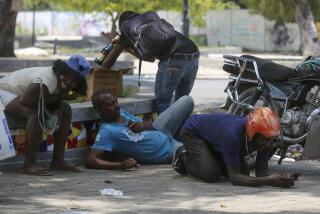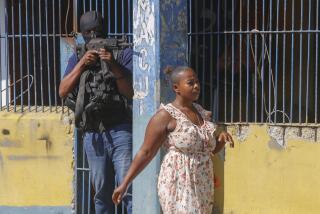Tunisia president appeals for peace, pledges reform
Reporting from Beirut and Tunis, Tunisia — Tunisia’s longtime president, rocked by weeks of unprecedented nationwide protests against his rule, suggested Thursday that he would abide by a constitutional age cap for head of state by not running again for office in 2014. He also promised freedom of speech, including lifting restrictions on the press and Internet as well as opening up the political system of his tightly controlled nation of 10 million.
With human rights groups estimating that dozens have died at the hands of security forces in increasingly violent clashes, President Zine el Abidine ben Ali also pledged to lower food prices, create a committee to fight corruption and “string-pulling” and acknowledged errors in his 23 years of rule, though he blamed deputies whom he has begun firing. He also ordered the military and police to stop shooting at unarmed protesters.
“I am addressing you now because the situation requires a change, a drastic change,” he said in a televised address to the nation, speaking in the Tunisian dialect instead of formal Arabic. “I have understood you. Yes, I have understood you. I have understood all of you: the unemployed, the needy, the politician and those asking for more freedoms.”
But it remained far from clear whether the announcements would be enough to calm widespread public rage. Much of the nation’s large-scale corruption is attributed to members of Ben Ali’s family and inner circle. Much of the brutal nature of the regime, chronicled last month in several classified U.S. diplomatic dispatches released by the website WikiLeaks, is attributed to his rigid rule.
The age limit for running for president is 75 and Ben Ali is 74.
In the hours before Ben Ali’s address, riots raged in the capital, Tunis, and other cities, as protesters angry about poor economic prospects and a lack of civil liberties looted government buildings and battled police.
Hospitals on Thursday were filled with victims of gunshot wounds, a Tunis resident said. Among those shot was an American man carrying a camera in the city center, another American living in Tunis said.
“It was absolute chaos,” the American, who asked that his name not be used, said in an e-mail. “It looked like protesters had been burning banks or stores controlled by members of the first family.”
Suddenly, police on motorbikes raced into the crowds. “They beat back protesters and used tear gas to try to dispel the crowd,” he wrote.
In the melee, his friend was shot in the upper leg and remained overnight at a hospital.
Tunisian activists both in and outside the country have turned to social media for political organizing, calling for a huge rally Friday in the capital’s November 7 square. And the nation’s largest union, which has endorsed the general aims of the uprising, called for a two-hour general strike Friday but refrained from urging supporters into the streets.
Many on Facebook derided Ben Ali’s address as a “farewell speech.” And minutes after he finished speaking, Tunisians defied an 8 p.m. curfew in the capital to take to the streets, tooting their horns in celebration.
“We are no longer afraid,” some chanted.
“ People are tired of it,” said Diogo Noivo, a North Africa specialist at the Portuguese Institute of International Relations and Security, a think tank in Lisbon. “People started to understand that regardless of how much they work, how much they study, they will never be able to improve their life conditions, because the rules are not equal for everyone. This is an unequivocal challenge to the regime.”
The rioters and protesters have made no formal demands, developed uniform slogans or held up banners with political messages, but they share a general disdain for Ben Ali and his family.
Amateur video of protests and rioting in the capital and other key cities showed Tunisians battling police officers and soldiers with rocks and firebombs and looting government buildings, black smoke rising in the distance.
Gunfire and teargas launchers could be heard across the capital, and there were reports of major clashes in the Ariana, El Mansoura and Ennasim suburbs of Tunis into early Thursday.
Officials have derided the protesters as looters and vandals. But some of the videos show uniformed police officers damaging shops.
Updated official information about casualties was unavailable. Until Wednesday, authorities had acknowledged 21 deaths. The website of the country’s official news agency was shut down. Two people were reported killed in the northeastern city of Nabeul and four in the far northern city of Menzel Borguiba, where dozens of shops and banks were set on fire, according to witnesses and residents.
Ben Ali, who is close to French President Nicolas Sarkozy and cooperates on security matters with the United States, has long contended that lifting restrictions on civil liberties would pave the way for radical Islamists in Tunisia. But few believe Islamists are in any position to take immediate advantage of the current turmoil.
“Islamists in Tunisia, they have been completely disbanded by the regime,” Noivo said. “The most important figures are exiled in Europe.”
Daragahi reported from Beirut and special correspondent Hassaini from Tunis. Special correspondent Alexandra Sandels in Beirut contributed to this report.
More to Read
Sign up for Essential California
The most important California stories and recommendations in your inbox every morning.
You may occasionally receive promotional content from the Los Angeles Times.










